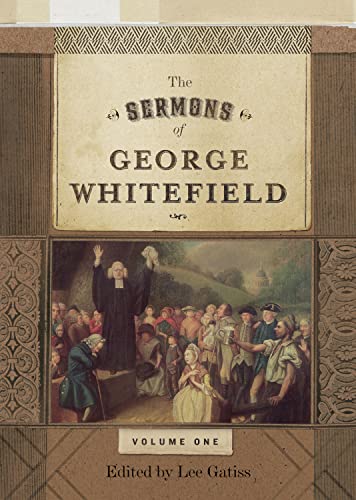The Sermons of George Whitefield.
Written by George Whitefield Reviewed By Tanner TurleyMartyn Lloyd-Jones called George Whitefield the greatest English preacher who ever lived. That assessment ranks him ahead of the great Puritan and Victorian preachers, including the “Prince” himself, Charles Spurgeon. In light of his gifts, influence during the First Great Awakening, and sheer volume of sermons on both sides of the Atlantic, estimated at 30,000, we could safely call Whitefield a preaching juggernaut. Thus, it is not surprising that Whitefield's sermons were republished for the first installment of the Reformed Evangelical Anglican Library (REAL), which seeks to recover a “more robust vision of Anglican theology and identity” (1:5). These two volumes contain sixty-one sermons, the vast majority of Whitefields's extant transcripts.
Lee Gatiss, also the Series Editor for REAL, introduces Whitefield's preaching methodology, Anglicanism, and Reformed theology. He believes, “we need a heavy dose of his theology, we need his inspiration, and we need his urgent international vision for evangelism” (1:41). At the same time, he offers a balanced critique pointing out some of Whitefield's flaws regarding church life, preaching style, and exegesis.
Readers will be helped by Gatiss' editorial work of the 1771 edition. He cleaned up the paragraphing and syntax without sacrificing Whitefield's “eighteenth century voice” (1:39). His scholarship as a church historian also enhances the work. Gatiss corrects the popular view that Whitefield did not intend to return to England after he departed in 1769 by pointing to contrary evidence in Sermon 61. Finally, his extensive footnotes also shed light on many of Whitefield's sources, quotes, and historical context. Though some readers may desire subject and Scripture indexes, their absence does not detract from the overall quality of the work.
As helpful as Gatiss's introduction and editorial work may be, the deep value of these volumes resides in the original sermons of the great preacher. Whitefield was a preacher who revered the Bible. His sermons were largely expositional, keeping the immediate and canonical context in view. The grand narrative of Scripture can be found throughout. His goal was to preach to the head and the heart. Sermon 59 exemplifies Whitefield's approach:
That we might deal with you as rational creatures, we have endeavoured calmly, and in the fear of God, to address ourselves to your understandings; but the hardest work is yet ahead, namely, to affect and warm your hearts. This I take to be the very life of preaching. . . . Moses and the Prophets, Christ and his Apostles, dealt much in exhortations, as well as in opening and explaining the weighty matters of the Law. And if we are taught by the same Spirit, we shall, like them, bring light and heat with us, when called to speak of, and enforce the things which concern the kingdom of God. Without proper mixture of these, however a preacher may acquire the character, in the letter-learned and polite world, of being a calm and cool reasoner; yet he never will be looked upon by those whose senses are exercised to discern spiritual things, as a truly evangelical and Christian orator. (2:421)
In every sermon, Whitefield preached in an experimental manner desiring a godly response from his hearers.
Though dimmed by the printed page, Whitefield's passionate and persuasive style shines through. His sermons are filled with exhortations and evangelistic appeals. Whether preaching to saints in a church, coal miners in a field, or passengers on a boat, Whitefield possessed an incalculable desire to see people converted to Christ. He consistently made appeals with eternity and the sovereign work of the Spirit in view:
If you perish, remember that you do not perish for lack of invitation. You shall stand forth at the last day and I here give you a summons to meet me at the judgment seat of Christ and to clear both my master and me. Would weeping, would tears prevail on you, I could wish my head were waters and my eyes fountains of tears, that I might weep out every argument and melt you into love. . . . But such power belongeth only unto the Lord, I can only invite (2:102).
Additionally, Whitefield knew his audience well and preached in a discriminating manner. He sought to persuade his hearers while keeping their spiritual and temporal circumstances in mind.
There is much to be gleaned from reading Whitefield's sermons. Becoming acquainted with Whitefield and his preaching should instruct, correct, and motivate a new generation of pastors and laypeople alike. In a day where there is a heightened focus on Reformed theology on the one hand and passionate mission on the other, Whitefield stands as a preeminent example of both. These volumes are a noble attempt to bring the Anglican Church and those of different denominational stripes back to such a vision through Whitefield's preaching. We are indebted to Gatiss and REAL for making these sermons available for today's church.
Tanner Turley
Tanner Turley
Redemption Hill Church
Medford, Massachusetts, USA
Other Articles in this Issue
The Profit of Employing the Biblical Languages: Scriptural and Historical Reflections
by Jason S. DeRouchieIn 1524, six years after posting his “Ninety-five Theses,” Martin Luther (1483–1546), father of the Protestant Reformation, charged his contemporaries...
The Earth Is Crammed with Heaven: Four Guideposts to Reading and Teaching the Song of Songs
by Douglas Sean O’DonnellPerhaps when you read the Song of Songs you feel as perplexed as the Ethiopian eunuch did with Isaiah...
C. S. Lewis argues that we should prefer old books over new books because every age has its own outlook...
‘Just right’. This is the key refrain in the Goldilocks story as she tries out the chairs, porridge, and beds of the three bears, whose home she has entered (apparently illegally, but nothing turns on that)...
For many people, the thought of missionary work sounds, at best, painfully old-fashioned...







